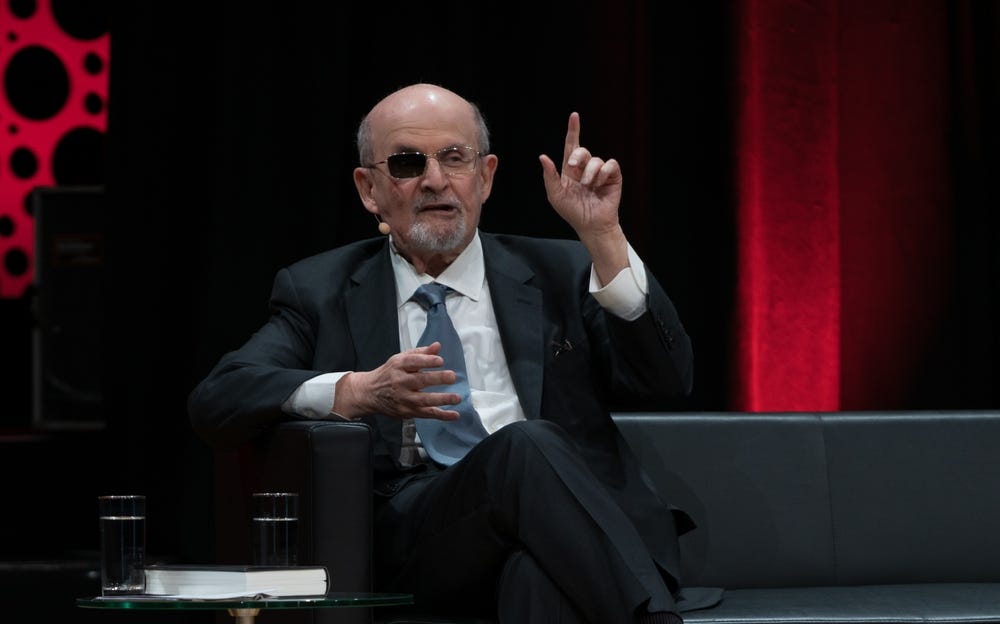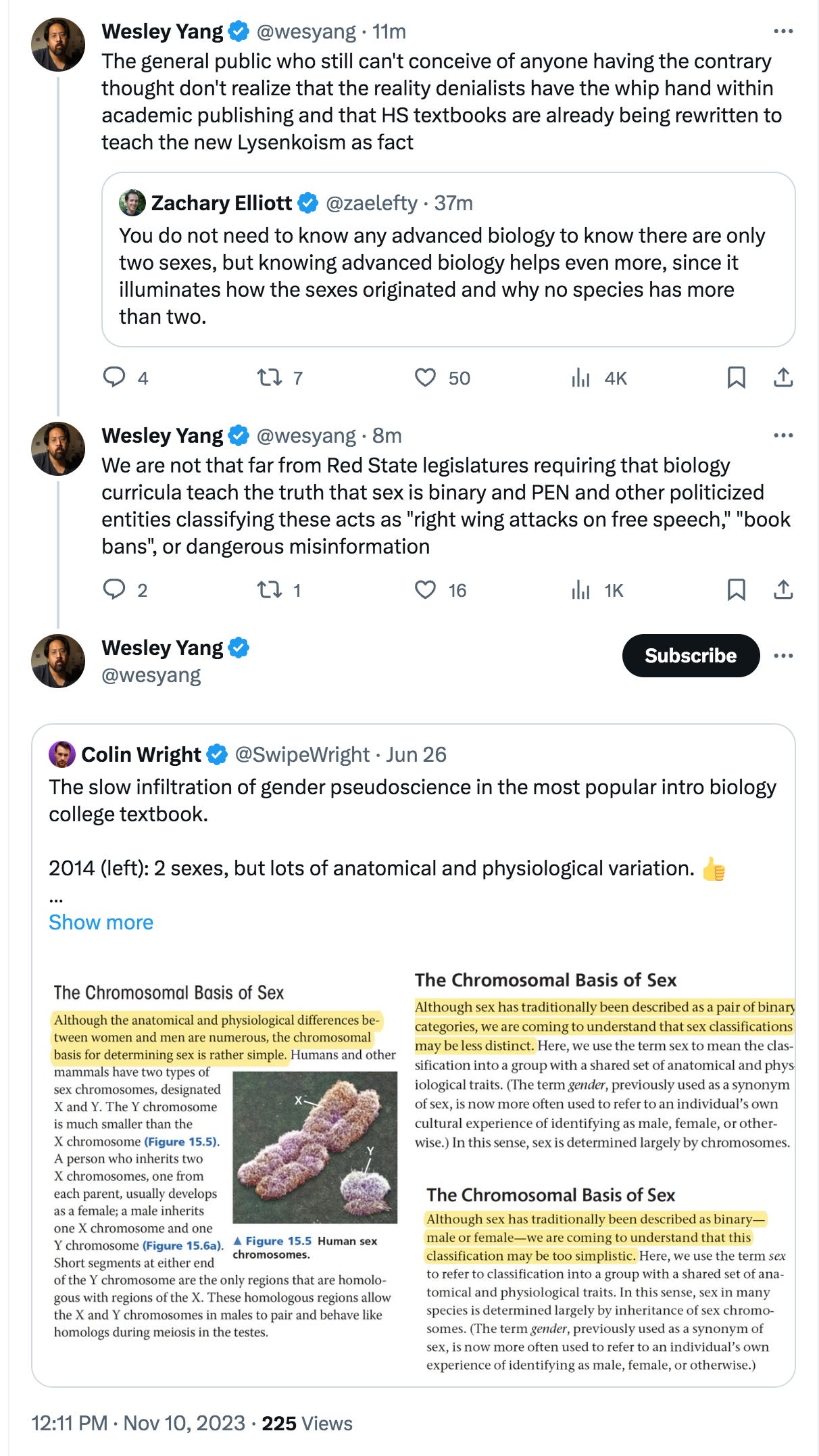E-Pluribus | November 10, 2023
Salman Rushdie on free speech for all; the darkness of academic ideology; Hamas propaganda is working.
A round-up of the latest and best musings on the rise of illiberalism in the public discourse:
Emma Camp: Salman Rushdie—'Literature Is Powerful, Writers Are Fragile'
In one of his first public appearances since being repeatedly stabbed last year, Salman Rushdie outlined his views on free speech during an interview with Princeton’s Bernard Haykel. At an event held by the newly founded American Academy of Sciences and Letters, Rushdie discussed the endurance of literature beyond the lives of its authors—and even beyond the age of governments that may try to suppress it. Emma Camp of Reason reports.
"In the free speech field, you find yourself constantly defending stuff that you really don't like," author Salman Rushdie said during an interview with Princeton University professor Bernard Haykel on Wednesday night. "You defend it not as itself but for its right to be."
"I think if we give up that principle, we're losing something very, very important," he continued. "If we can't trust ourselves as a culture to accommodate ideas we don't like, then our ideas lose their value as well, because they become authoritarian."
[. . .]
"The only reason to write is because you cannot avoid doing so because the book feels so necessary to you—not to the world, to you—that you have to. Those are the books to write," Rushdie said. "It takes a long time to write a book, and a very short time for it to be dismissed."
[. . .]
"A unifying thing of all the people who had led the attack on The Satanic Verses was that they had not read it," Rushdie said. "If you look at the attacks on works of literature, they're almost always conducted by people who haven't read them…So this book that was attacked, in a way, didn't exist."
Rushdie emphasized how literature can endure in the face of censorship, but that writers themselves often fall victim to state repression.
"The poet Ovid was exiled by Augustus Caesar to this dump on the Black Sea, spends his life pleading to be allowed to come back to Rome, never allowed to do so," Rushdie said. "The poetry of Ovid has outlasted the Roman Empire."
Read it all here.
Jacob Howland: The Genocidal Logic of Academic Ideology
Pro-Palestinian voices in the current conflict have said the Hamas attack in October “did not occur in a vacuum,” ultimately pinning the blame on Israel’s alleged repression of Palestinians over the last 70 years. Jacob Howland at Quillette writes that much of academia’s response to the attack is not occurring in a vacuum either; it is the fruit of identity politics so many universities have pushed for decades.
After October 7, students rallied at universities around the United States to denounce Zionist “genocide,” hold vigils for the Palestinian “martyrs,” and applaud Hamas’s efforts at “decolonization.” (High school students, too, walked out of classes to protest the Israeli military response.) Students and faculty at several schools also ripped down posters of kidnapped Israelis. A Jewish student was beaten at Columbia, and Jewish students at Cooper Union had to take shelter in a library from a mob chanting “Free Palestine!” And a student at Cornell threatened to shoot, stab, rape, and slit the throats of his Jewish classmates.
Anti-Semitic incidents have spiked in the United States and globally since October 7. Last Saturday, on the Jewish Sabbath, the New York Police Department advised Jews to stay off the streets, while thousands of protesters calling for the elimination of Israel “by any means” blocked the Brooklyn Bridge and plastered businesses with signs saying “Zionism is terrorism.” A mob shut down an airport in Dagestan when it hunted Jews on a flight that had arrived from Tel Aviv.
[. . .]
How did it happen that, less than 80 years after Auschwitz, Jews are widely seen as agents of tyrannical domination? Anti-Semitic hostility, fueled by lingering theological anti-Semitism—the ancient Christian charge of deicide against the Jews—as well as European guilt for the Holocaust and Arab envy, is a large part of the answer.
But another part of the answer is indoctrination that poses as education. For years, many professors of humanities and the social sciences have embraced crude theories of identity politics that divide the world into victims and victimizers, locked in a zero-sum competition for power. These theories include “intersectionality,” which asserts that “axes of privilege, domination, and oppression” combine to marginalize certain social groups, and “decolonial theory,” which teaches that European modes of knowledge and power victimize indigenous peoples. A generation of graduates, especially from elite universities, have applied these ideas in governmental policy, K–12 education (where anti-Semitic curricular modules are increasingly common), philanthropy, culture, and the media.
The recategorization of Jews as oppressors follows inevitably from the scapegoating logic of identity politics. According to that logic, oppressors achieve their “privilege” on the backs of the oppressed, who are passive, helpless, and miserable. This is how activist professors and students see the Palestinians. The Jews, by contrast, are manifestly dynamic and flourishing. After the Holocaust, the surviving remnant of European Jewry rose from the ashes. Together with hundreds of thousands of Jews expelled from Arab nations after 1948, they built the state of Israel and made the desert bloom. Others set down roots and found success in the United States. How could these people be victims, if they don’t act like it?
Read the whole thing.
Michael Puttré and Michael J. Ard : Hamas Is Winning the Information War
As damaging as Hamas’s war of violence has been over the last five weeks, its information war may be just as damaging in the long run. Michael Puttré and Michael J. Ard make the case at Discourse Magazine that far too many in political, media, and diplomatic circles are buying what Hamas is selling.
Hamas’ path to victory doesn’t depend wholly on its warrens of defensive positions in Gaza City. Far more importantly, it must win the information war to survive and fight another day. As the media urges cease-fires on Israel, Hamas has room to breathe, and Israelis’ lack of caution in bombing populated areas in Gaza risks turning the conflict in Hamas’ favor.
Those calling for a cease-fire may not realize such an action will only prolong the war. Nearly 200 years ago, Prussian general and military theorist Carl von Clausewitz warned about such “kind-hearted” people who think war can be fought with minimal bloodshed. Avoiding civilian casualties is an important consideration, but it can't be the main goal for any war. “War is such a dangerous business that the mistakes which come from kindness are the very worst,” he wrote. In his analysis, however, Clausewitz didn’t have to account for the intense media environment of today. The information war has become the center of gravity of modern conflict.
Especially for democratic governments, losing the information war often makes its war efforts unsustainable. The British gave up 26 counties of Ireland to the Irish Republican Army in 1921 largely because of the IRA’s superior propaganda and shifting public opinion in England. We Americans lost in Vietnam despite dominating on the battlefield because, especially after the 1968 Tet offensive, our media turned on the war. But the British and the U.S. could walk away from those conflicts. With Gaza and Hamas, Israel doesn’t have that luxury.
Contrary to the mainstream media narratives, Israel is sensitive to public perception and civilian casualties. According to Ronen Bergman in “Rise and Kill First,” in Israel’s intense intelligence war against Hamas from 1998 to 2004, Prime Minister Ariel Sharon halted Israel’s targeted killings after the nation had lost too much ground with the international community. Hamas, also shaken by the losses to its leadership, ended its suicide bombings.
[. . .]
Those calling for a cease-fire in Gaza, whether they are kind hearts or cynical operatives, for all intents and purposes are acting to prevent Hamas’ defeat and give it time to reconstitute its forces to attack again at a time of its choosing. This is why Netanyahu said there will be no more “rounds” with Hamas. He has subsequently said there will be no cease-fire unless Hamas frees its hostages, a climbdown from his earlier declarations.
Read it all.
Around Twitter (X)
Wesley Yang speculates on what comes next if the gender ideology movement continues its war on science:
And here you thought that black stuff athletes put under their eyes was to reduce glare. The Foundation for Individual Rights and Expression says one California middle school is giving the First Amendment a black eye:
And finally, also via FIRE, what free speech isn’t (click for video):











